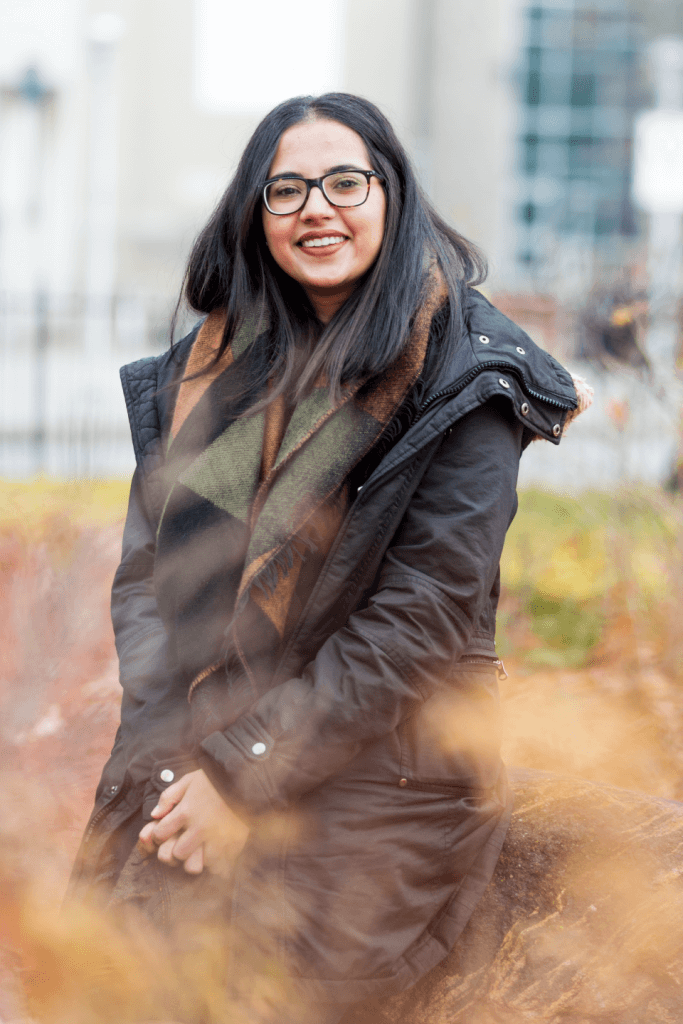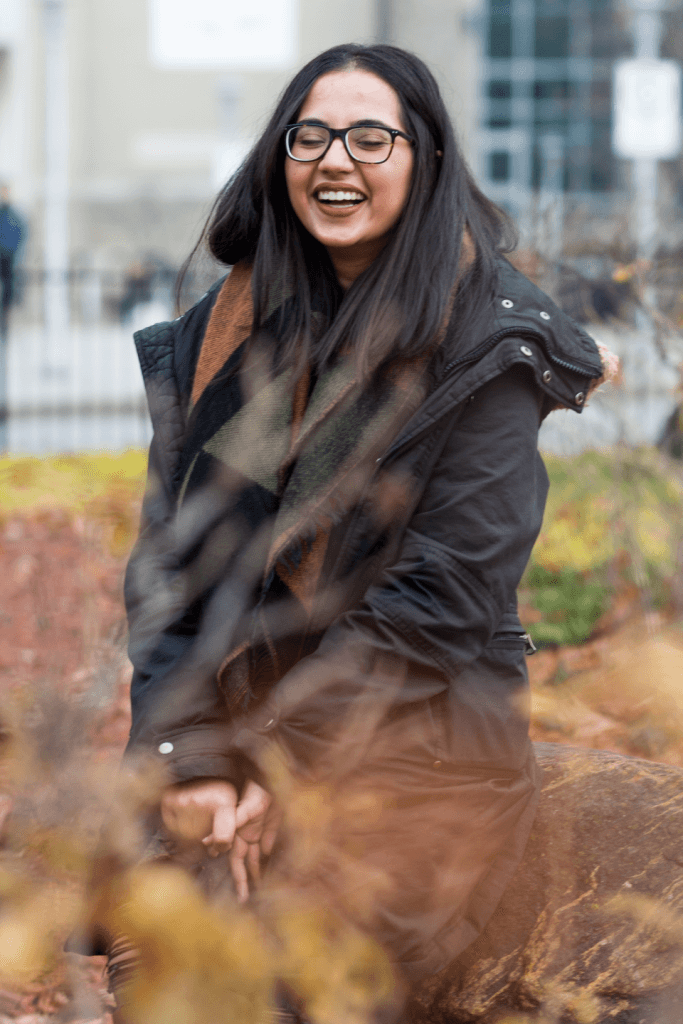1. Have you ever experienced a time when you felt there was a barrier in your way and if you did, how did you manage it?
I am managing a barrier right now because I am currently applying to grad schools for clinical psychology. A lot of schools want that honours psychology background, but I have a biochemistry background, so when I’m applying to grad schools, they are a little hesitant about taking a chance. It’s not something that I can address or fix because I can’t change my degree.
To work around this barrier, I am doing a second degree so that by the end of April I will have a BSc in Biochemistry and a BA in Psychology. It won’t be an honours degree, but it’s the most I can do for now. If I don’t get into a grad school and I’m still really interested in pursuing clinical psychology, then I’ll do more psychology courses.
2. What are you curious about?
I am curious about what is going to happen once I leave McMaster. Where will I end up? What will I study? Am I going to end up on the path that I want to? How many times is it still going to change? In my first year, I was interested in pursuing medical school, which is different than what I want to do now.
I also want to know how I can make an impact on the community and in the lives of kids. For example, through my volunteering position at the Children’s Aid Society, I have realized that I enjoy working with children. I am curious about how they process things and how they develop.
3. What was the process of switching from the medical school path to the one you’re on right now?
In my first year, I wanted to go to med school because my parents are doctors, so that was the profession that I knew. Growing up, I used to sit in my dad’s clinic while he checked patients and I was curious about what he was doing.
Later, I had to ask myself, “Do I want to be a doctor because I want to fit in or do I want to be a doctor because I want to treat people? To what capacity do I want to be involved in the diagnosis and the treatment?” When I was thinking about it, I wasn’t sure.
First and second year, I wrote the MCAT, but I didn’t really study for it. In third year, my parents told me to apply to med schools. I didn’t want to, so I chose to wait for another year. In fourth year, I got very indecisive about what I wanted to do. So I told my parents I wasn’t going to apply to med school and I ended up applying to nursing and public health instead. I felt that these programs would give me time to think about what I wanted to do.
I didn’t get in and I got waitlisted at a couple of schools.
I’ve always been the friend who listens when others need me. I find people can confide in me and I feel proud that I can be that person for others. I also enjoy it. So when I got the opportunity to talk to a psychotherapist, I was really interested in the work she was doing and I asked her about her career path. Then I did some research on my own and talked to more people.
After that experience, I told my parents that I was really interested in this profession. They’ve been very supportive.
4. Reflecting back on your career journey, are there any patterns in your interests that have led you to where you are right now?
I think I’ve always been interested in psychology, but I never took a chance on it because in first year, I had only taken one psychology course. At the time I had to decide my program, I talked to my parents and told them that I want to apply to PNB as my first choice. They asked, “Why? How many psychology courses have you taken?” After talking, my parents suggested that since I had only taken one course, it wouldn’t give me a full sense of the field of practice to decide whether I wanted to go into it.
I decided to place biochemistry as my first choice, PNB as my second, and molecular biology as my third. I got into the biochem program, so I never found out if I could have ever gotten into PNB. After that, I never really took any psych courses until my third year. After I graduated from my biochem degree and went through the process of researching a career path in clinical psychology, I took a few psych courses and realized how much I still enjoyed it. All the courses I’m taking this year are psych courses. I love it. Even though there are deadlines to worry about, I enjoy what I am studying.
5. Knowing what you know now, what would you tell your first year self?
Go with your gut. In first year, my gut told me to do psychology, but at the time I questioned myself. I learned that it’s important to make your own decisions, because at the end of the day, if it is a decision you made, you can blame yourself if it doesn’t work out. If someone else influenced your decision, you’ll always wonder, “What if they never said anything? Would I have made a different decision then?”
Also, if you don’t like something, change it. You don’t have to stick to what you started with. There are a lot of options. Now that I am applying to grad schools, I am not only emphasizing that I’m doing a degree in psychology, I am also trying to incorporate what I learned in biochemistry and do some research that involves both the topics, so I can use all the skills I have.
6. What are some of the changes/risks you have taken that you are glad you took? Why?
Changing programs and career paths was a risk. I think another risk I’ve taken is talking to profs. I’ve honestly emailed over a hundred profs from different schools and received tons of rejections saying that they don’t have enough space, I’m not qualified, or that they’re not interested in working with me. One time a prof actually told me I didn’t have the background or qualifications. That was the bluntest email I’ve received and I remember crying after reading it. But that’s the thing: if you don’t try, you’ll never know.
At the end of the day, you have to try. I know it’s so much easier to say than do because you get into that thought process… What if I don’t get in? What if I fail? What if no one accepts me? What if I never find anything? It’s just a loop. The thing is, these are all just “what ifs.” There’s a whole other side to them. What if you do get in? What if you get into the program you wanted to? You have to consider the other side, too.
The time I got that negative email from a prof, two hours after, I got an email from another prof about setting up a meeting to chat. What going through that experience has reminded me is that in that one moment, you might feel like it’s the end of the world, but if you wait, there might be someone else who wants to collaborate with you.
7. What do you find most exciting when you think about your future?
I am excited to really establish myself. I didn’t really enjoy high school. I felt isolated because I had just moved to Canada. When I got to university, I told myself that I would be the confident person I was back in India and I went out of my comfort zone. Over the years, I found my friends who have become family. Then things happened and the confidence I had in my opinions and decisions shrank; I became less confident in what I did.
I want this grad school experience to be my fresh start to establish myself as that confident person that I know I am. I don’t know where to find her right now, but I think in the short term, a change of space and environment is what I’m looking forward to the most.
In the long term, I am excited to work with kids, teens and adults. I’ve met people who have been through a lot. I’ve realized that all they want is somebody to talk to – I want to be that person. I know I can’t be that person for every single person on this planet, but if I can be that support for at least some, I would be happy.


About Ananya:
Ananya graduated from McMaster with a Bachelor of Science degree in Honours Biochemistry in June 2018. She is currently doing a second degree, a Bachelor of Arts in Psychology and is expected to graduate in June 2019.
Learn more about The Planned Happenstance Project.